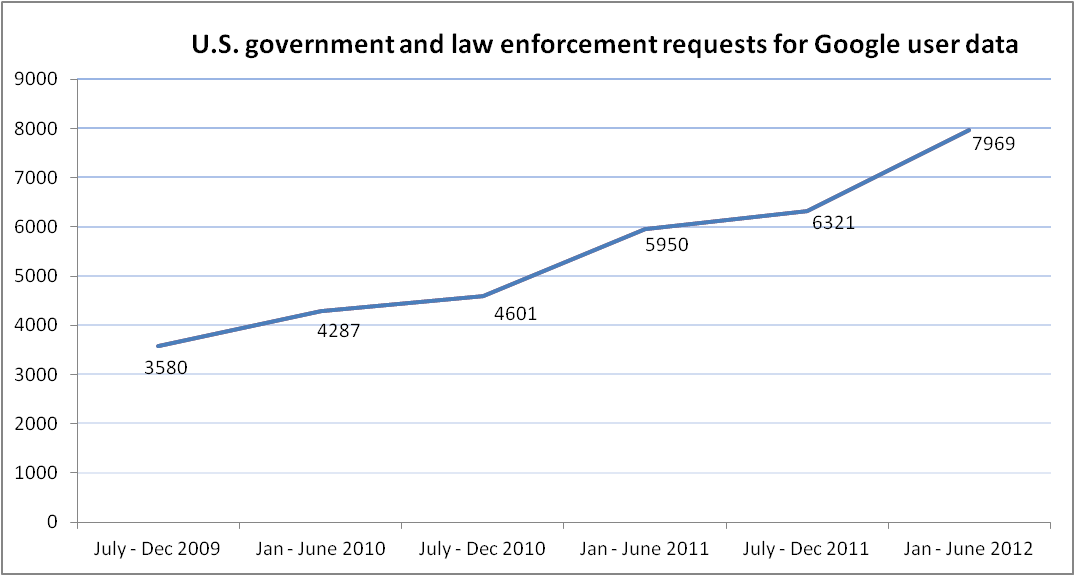The U.S. Government’s Growing Appetite for Google Users’ Data
U.S. government and law enforcement agencies are increasingly asking Google to hand over data on its customers to help with investigations.

The search and ads company today released figures revealing that it was asked to hand over user data 7,969 times by US agencies in the first six months of 2012 - an increase of 26 percent over the previous six months. That continues a long established trend in the figures released in Google’s twice-yearly transparency report and charted above. The 7,969 requests asked for data from a total of 16,281 user accounts, and ninety percent of the requests were complied with.
Google is unusual amongst Web companies in that it shares information about the number of such requests it receives. Social network Facebook is likely subject to a similarly high volume, for example, but does not disclose any information on their number or origin. Google started reporting the number of requests for its data in 2009, and the number of affected accounts in 2011. Since January 2011, U.S. authorities have requested data pertaining to a total of 39,581 accounts.
Law enforcement and government agencies see Google and other companies as valuable sources of data that can help with criminal and intelligence investigations, such as the one that led to the resignation of CIA director David Petraeus last week. Knowing what a person searched for, who they emailed, and which IP address they logged in from can provide evidence of a person’s motivations, movements and much more.
Some privacy activists say that the ease with which U.S. authorities can extract information on users from Google and other companies suggests changes in the law, and company policies are needed to protect innocent users against the risk of unnecessary surveillance. Data can only be handed over by a company if it exists, and some campaigners think companies such as Google should reduce how long they retain some information. For example, Google currently stores search query details for 9 months before anonymizing them, a period some argue is too long. The main target of legal campaigning about data access is against the 1986 Electronic Communications Privacy Act, which allows government and law enforcement to obtain data from Internet companies without a warrant if it is at least 6 months old.
Keep Reading
Most Popular
Large language models can do jaw-dropping things. But nobody knows exactly why.
And that's a problem. Figuring it out is one of the biggest scientific puzzles of our time and a crucial step towards controlling more powerful future models.
The problem with plug-in hybrids? Their drivers.
Plug-in hybrids are often sold as a transition to EVs, but new data from Europe shows we’re still underestimating the emissions they produce.
Google DeepMind’s new generative model makes Super Mario–like games from scratch
Genie learns how to control games by watching hours and hours of video. It could help train next-gen robots too.
How scientists traced a mysterious covid case back to six toilets
When wastewater surveillance turns into a hunt for a single infected individual, the ethics get tricky.
Stay connected
Get the latest updates from
MIT Technology Review
Discover special offers, top stories, upcoming events, and more.